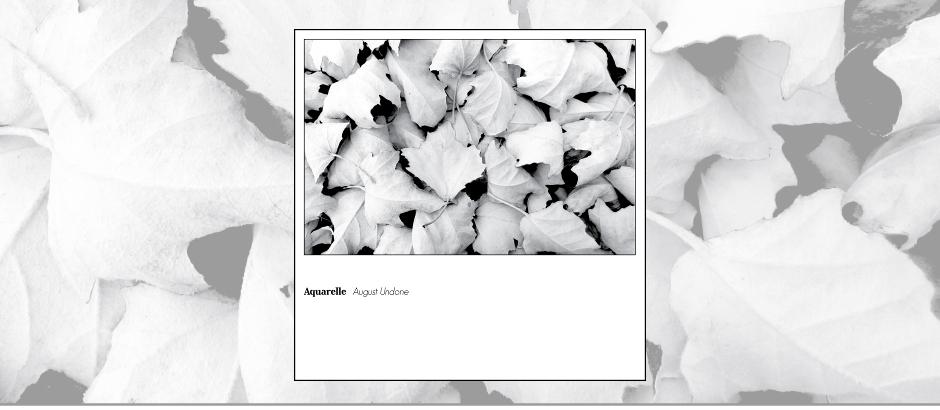Wisconsin drone artist’s first LP in two years doesn’t quite live up to its grand ambitions, says Ian Maleney.
August Undone opens strongly. ‘Within/Without‘ begins with a quiet droning haze, full of small swells. It eventually washes out of the picture only to return with the backing of plucked strings and rattled tambourine percussion. Reverb dominates, the individual sounds blurring together even as they keep time. The following track is the album’s longest, ‘This Is No Monument‘. At 11 minutes, it’s hard to see what else it is. It follows a pattern that will soon become familiar across the rest of the record. First, the noisy haze, from which the guitar and piano emerges. At some point shortly after the midway mark, the near-silence. Then a return, with a set of new sounds building towards a small, somewhat restrained crescendo. Ryan Potts, the man behind the Aquarelle name, is skilled enough as a musician to make sure it doesn’t get boring, but the sounds used are nothing new and hard to get excited about. There is something missing in the way of texture.
‘A Flare‘, the third of the album’s five tracks is a clear case in point. While it starts small, variations on a simple melody, the song grows ever hazier and fuller. By the half-way mark, the sound is huge, swelling stormily around that same three-note melody buried deep in the centre. It is guitar blown out of all proportion, harsh fuzz robbing the noise of any real beauty and the repetition shores it of depth. The sound is like waves, not just waves of sound, but a sound like actual waves, distorting through a degraded signal path. Eventually the sound fades, without having really gone anywhere or done much. There just isn’t enough heart in the sound itself to justify the lack of development through the track and so it feels longer than its five minutes.
Similar problems beset ‘Sandpaper Winds‘. The central dichotomy of near-8-bit synth washes coming up against the acoustic guitar and piano fails to really create an engaging sound world, a world of any depth. The melodies are pretty but the arrangement is lacking; the sounds move through each other without much character or any desire for progress. The guitar sounds dry and loud in the centre of it, neither strong enough to hold up the rest of whats going on or weak enough to sit fully in the mix. Left to stand alone, the synth lines would have been more interesting. As it is, they function merely as a swirling background to the staid, static guitar.
‘Clockless Hours‘ ends with a flow of swooping strings and picked-out piano notes. They fall from a cloud of noise which makes up most of the track’s running time. The cloud is a beautiful haze, unhurried and well layered, the best example of the form to be found here. It needs no ornamentation and Potts wisely lets it stand by itself without interference. It’s the first time you can really drift away on a particular sound, making the graceful fall to silence at the end even more beautiful.


